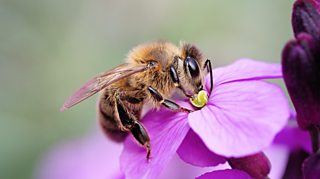Adam Hart: 10 things we learned about social insects
Hart #Hart

7. …and also tremble dance.
Instead of transferring all of their nectar in one go, bees do three or four transfers. Adam set up a very intricate experiment to track and understand this behaviour. The result showed that the “tremble dance”, where bees literally shake from side to side, was part of a supermarket-style checkout system in which bees deposit nectar and recruit others to pick it up, and so avoid overloading.

A honey bee
In 20 years’ time, we’ll be quite used to buying insect protein-based food
Adam Hart
“There’s a very small period of time during the year where they actually pile in most of the nectar that they need to get them over the winter,” says Adam, “so it’s really crucial they get it right.”
8. Insects are not toasters!
It’s generally accepted that the hive mind is, as Adam says, “capable of doing some really quite challenging tasks.” Individual bee intelligence is harder to work out.
However, with their mathematical nous in relation to plotting distance and direction, it’s fair to say that bees are more than pollen-collecting drones and that “there’s a lot going on inside a group of neurones, not much bigger than a pinhead.” That’s Adam’s take, and to underline it he quotes another a fellow scientist who, on another Radio 4 show, observed: “They don’t have the rich, internal lives that we have, but they’re not a toaster.”
9. We will be eating insects for tea
Insects are potentially revolutionary in offering a protein alternative to meat, although the notion of individual insect intelligence means that there’s an ethical factor in the mix.
A lot of the research into entomophagy, as eating insects is known, is actually focused on new animal feed – replacing fishmeal with black soldier flies, for example. However, Adam believes that insect foodstuffs for humans could become the norm.
“I don’t think any of us right now are going to be wandering down to the supermarket to buy a box of crickets to fry up,” he says, “but, in 20 years’ time, we’ll be quite used to buying insect protein-based food. It won’t have legs pointing out of it and wings, it’ll be processed in a way that’s palatable.”
10. Bees are not always busy
When you see bees in the hive, doing waggle dances and tremble dances, or out foraging, you imagine that the saying “as busy as a bee” might apply most of the time. However, Adam notes that bees “do spend a lot of time resting”.
“It’s quite adaptive, really, because they’re not wasting energy, but also, they’re not running around getting in each other’s way, which also means they’re not spreading parasites and things.”
“There is a definite advantage in not doing anything if there’s nothing to be done, and that’s a nice lesson for us to learn from them.”
Listen to Adam Hart on ants, bees and insect burgers